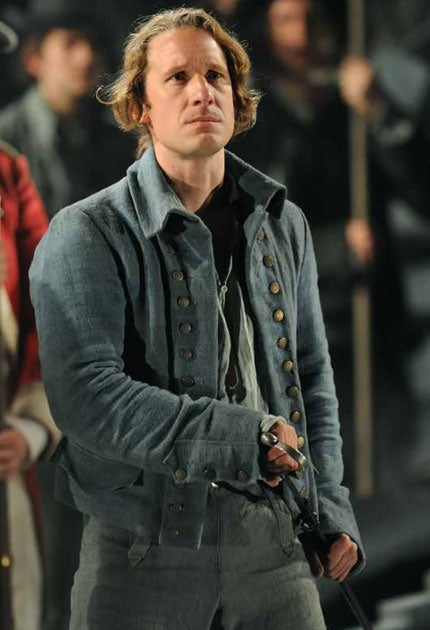A late flowering for a great Britten
When Billy Budd opens Glyndebourne's season tomorrow it will bring the curtain down on an old feud, says Lynne Walker

Your support helps us to tell the story
From reproductive rights to climate change to Big Tech, The Independent is on the ground when the story is developing. Whether it's investigating the financials of Elon Musk's pro-Trump PAC or producing our latest documentary, 'The A Word', which shines a light on the American women fighting for reproductive rights, we know how important it is to parse out the facts from the messaging.
At such a critical moment in US history, we need reporters on the ground. Your donation allows us to keep sending journalists to speak to both sides of the story.
The Independent is trusted by Americans across the entire political spectrum. And unlike many other quality news outlets, we choose not to lock Americans out of our reporting and analysis with paywalls. We believe quality journalism should be available to everyone, paid for by those who can afford it.
Your support makes all the difference.It's not really our kind of thing, you know," declared Glyndebourne owner John Christie to his friends arriving for the premiere of a comedy opera by Benjamin Britten. What he and his brigade of white-tie supporters would have made of Britten's powerfully moving, all-male masterpiece, Billy Budd, is anyone's guess.
When Billy Budd opens the Glyndebourne Festival tomorrow it will be its first airing at the Sussex opera house, nearly 60 years after its acclaimed Covent Garden premiere. Perhaps because the score calls for the largest orchestra of any Britten opera, perhaps because it requires the atmosphere and acoustic of the new, enlarged theatre or perhaps because of its homoerotic undercurrent, it's been shamefully overlooked in the series of fine Britten productions at Glyndebourne since the premiere of The Rape of Lucretia in 1946.
Now Michael Grandage, artistic director of the Donmar Warehouse, makes his operatic debut directing Billy Budd. Based on Herman Melville's tale about the battle between goodness and malignity on board a man-of-war, the opera – with a libretto co-written by E M Forster – revolves around the cross-currents of justice, duty and compassion. Beneath its surface there's an identifiable element of sexual frustration. Joan Cross, who had created the role of Lucretia, was "terrified by the cruelty of it" while the composer Michael Tippett particularly hated the moment "when the Novice is brought on and he's been flogged, like a Crucifixion."
Britten's relations with John Christie had begun cordially enough, despite their differences. Christie, an eccentric, Eton-educated, English landowner, and recipient of the Military Cross, had little in common with the chippy young composer who had spent the early years of the war as a conscientious objector in America. Both, however, saw the advantage of collaboration in the formation of the Glyndebourne English Opera Company.
The Rape of Lucretia, the first work to be put on by these unlikely bedfellows, marked the re-opening of the opera house after the war. Two weeks into rehearsal, Britten reported that Glyndebourne was "an excellent place to work in". But soon one observer noted "a marked coolness from Ben towards John Christie". According to Humphrey Carpenter's biography of Britten, part of the trouble was Christie's John Bullish manner, while Britten's partner, Peter Pears, heard some "very ill-informed and ill-timed criticism" from Sir John, who commented that Lucretia had "no music in it".
After a loss-making tour of Lucretia, Christie was left seriously out of pocket. But he gamely revived Lucretia the following year, along with another Britten premiere. By the time Albert Herring opened in 1947, there was what Carpenter describes as "open warfare" between Christie and Britten. After the premiere of Albert Herring, Britten described the founder of Glyndebourne Festival Opera as "a mischievous, mad old man". He wasn't invited back. Not in tune with either contemporary music or homosexuality, John Christie didn't feel any need to offer an olive branch, though he did recognise Britten's extraordinary talent.
Very soon after succeeding his father as chairman in 1962, George Christie was disappointed that Britten turned down the invitation to compose an opera for the festival due to his commitment to his own Aldeburgh Festival. Glyndebourne eagerly offered to put on any new Britten opera in the future. It wasn't until 1981, however, five years after Britten's death, that a work of his – A Midsummer Night's Dream – was seen again at the festival. Between then and now there have been thrilling Glyndebourne productions of The Turn of the Screw, Peter Grimes, Owen Wingrave and Death in Venice and another Albert Herring. This staging of Billy Budd is long overdue.
'Billy Budd', Glyndebourne Festival (01273 813813; Glyndebourne.com) in rep tomorrow to 27 June
Join our commenting forum
Join thought-provoking conversations, follow other Independent readers and see their replies
Comments